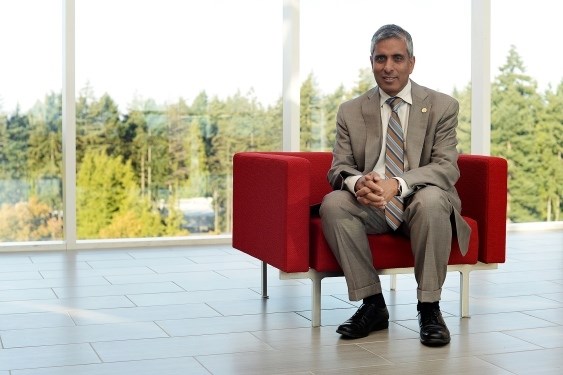The controversy surrounding the resignation of UBC president Arvind Gupta last summer should have faded away by now.
Even the disturbing sidebar, allegations of infringement on academic freedom from Sauder School of Business faculty member Jennifer Berdahl, should have slipped from the news.
She claimed to have been silenced and threatened after she posted her opinion of Gupta’s resignation on her website.
Recall the Dean of the Sauder School of Business apparently told her that the post would hurt UBC’s fundraising campaign. Berdahl also got a phone call regarding her comments from the chair of the UBC Board of Governors John Montalbano. But Montalbano fairly quickly resigned from the board “in the best interest of the school.” And that should have been that.
After all, the province’s biggest and most important post-secondary institution has had no shortage of scandalous events to take over the front page during the past several months as it celebrates the 100th year since its founding.
The “sense of betrayal” expressed by female students and subsequent apology by the university for its failure to respond quickly to the half dozen allegations of sexual assault by a male UBC grad student who was ultimately expelled, should have done it as a diversion.
Then, two months ago, there was the ham-fisted invasion of privacy by the Dean of Arts in publicly announcing that the renowned Canadian author and head of the university’s creative writing department, Steven Galloway, was suspended because of “serious allegations.” This, even though Galloway said, “I don’t even know what the allegations are.”
But then last week, on Jan. 25, the university, in response to several Freedom of Information requests regarding Gupta’s departure, dumped a package containing more than 800 pages onto the Internet for all to see. The heavily redacted document offered little insight, prompting the headline: “Dump sheds little light.” The story noted “it was likely to do little to dispel intense speculation.”
And then. And then. Within 24 hours, a group of students at UBC, using nothing more than a commercial bit of software, discovered they could actually use the downloaded material to access the un-redacted documents. Their findings, once posted on the website reddit.com, were like a defibrillator applied to a body where hope of recovery was all but gone.
The full text of letters and emails between Gupta and Montalbano, as well as other members of the Board of Governors executive committee, were explosive.
They detailed a disrespectful disruptive and dysfunctional relationship between the board and Gupta. To say, as the board does, that Gupta’s first year in the job was an “unsettled one” was an understatement.
A letter from Montalbano accuses Gupta of possessing “an indifference or intolerance of the board at best — or worse — an intended disregard for its authority.”
Gupta responds that the board would do well to join a national organization that would allow it to improve its skills and understanding of board governance.
It was clear from the outset that hiring Gupta was a high-risk gamble. There were, of course, some advantages: he was an inside candidate, which usually means less disruption in transition. He was the first person of colour to hold the position in a university that was increasingly diverse in its population. And, most importantly, he was a proven winner when it came to fundraising; before becoming president of UBC, he was the head of Mitacs, a not-for-profit organization working with universities and corporations along with both senior levels of government to deliver research and training programs to support industrial and social innovation.
But what he lacked was skill to manage the transition and the fundamental ability required of every CEO, which is to manage his board. He was clearly unable to keep the board properly informed, so they were, for example, blindsided by breaking news such as the high-profile resignation of the head of the UBC athletic department. And Gupta was obviously incapable of keeping his board on side. Just review the acrimony in their comments about his conduct.
The board’s failing was in not seeing the significant risk they were taking and not finding a way to remedy it sooner in one way or another.
Which means this story has still some way to run before it is over.
@allengarr



